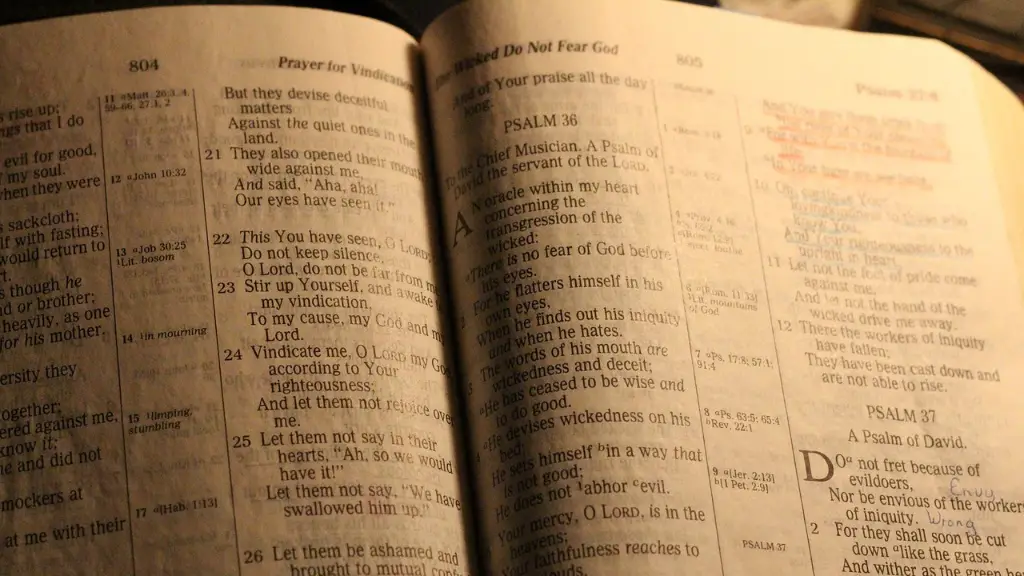What Does The Bible Say About Gambling?
The Bible doesn’t have a lot to say explicitly about gambling, and the verses that can be interpreted as an outright prohibition are debatable. However, most Bible scholars and theologians believe Jesus would oppose gambling for several reasons that become evident when examining the background of the Bible and its teachings on the dangers of wealth, the importance of work and stewardship of resources, and the need for moderation.
Since money is often used in gambling, Proverbs 13:11 warns, “Dishonest money dwindles away, but he who gathers money little by little makes it grow.” In other words, it is better to save money than to be extravagant, especially with something as risky as gambling. Deuteronomy 22:11 and Leviticus 19:19 explicitely forbid charging interest for loans, which may suggest the Bible would oppose gambling as it, too, involves the chance of accruing debt the recipient may struggle to repay.
The Bible also records acts of gambling, often with negative consequences. The most well-known example of gambling in the Bible is when the Roman soldiers cast lots to determine who would receive Jesus’ clothes after his crucifixion (Matthew 27:35). Furthermore, when Adam and Eve sinned by eating of the Tree of Knowledge, the punishment was to no longer gain knowledge “by the sweat of your face” (Genesis 3:19). This reveals God’s intent to bless us through work, and most forms of gambling don’t permit this opportunity.
In the book of James, the New Testament looks down on those who gain wealth through “foolish” means. James further explains that a gambler can be seduced by the love of money and does not consider the implications or consequences of his or her actions. The Bible is clear about being controlled by material possessions and the concept of gambling is indeed a form of materialism.
Moreover, there are several verses warning us over our time here on Earth. We should use the time allotted to us to help our fellow man, instead of wasting time and money on activities of chance. As Proverbs 14:23 mentions, “All hard work brings a profit, but mere talk leads only to poverty.” Gambling does not benefit our bodies, our minds, or our spiritual walk with Christ, so why should we waste our time and money on it?
Gambling In Other Religious Traditions
Gambling as an activity has been around since the dawn of civilization, and its ubiquity across cultures offers a clue that various beliefs don’t uniformly align either positively or negatively on the activity. Islam, Hinduism and Buddhism all have their own edicts on gambling, and none of them is particularly welcoming.
Islam, the world’s second-largest religion after Christianity, sees gambling as potentially leading to urban violence and unrest, and views it as an act of fidya. Hindus, the predominant religion in India, largely take a moralistic view similar to the Christian one—gambling may be deemed acceptable in some instances but is strongly condemned in general. Finally, Buddhism, centered in southeast Asia, generally renounces gambling as something that distracts from spiritual pursuits of enlightenment.
Overall, these religious traditions caution their followers to avoid the temptation of gambling and its potential for negative outcomes. Tips for those who still feel inclined to gamble include a good understanding of odds, responsible gambling behaviours and setting reasonable limits.
Effects Of Problem Gambling In The Bible
In some cases, gambling can become habit-forming and compulsive. The Bible speaks of this problem, and the dangers of addiction, in Proverbs 23:21, which reads, “For the drunkard and the glutton will come to poverty, and drowsiness will clothe a man in rags.” The first part of the verse is a warning against compulsive behavior, such as drinking and overeating, while the second part warns against allowing yourself to become slain into complacency and wasting time and resources.
Gambling is often compared to alcohol or drug addiction due to a similar cycle. As the gambler gradually obtains greater experience and becomes a fan of the “high” that gambling can bring, the gambler becomes more and more susceptible to the addictive powers of this activity. In addition, the refusal or difficulty to stop or reduce the amount and intensity of betting can lead to potential disaster and financial ruin, reinforced by Mathew 4:19-22, which speaks of the temptation of Satan in leading us to poverty.
The Bible says that believers should avoid compulsive acts such as gambling and instead use their resources and time to benefit themselves and their families by engaging in constructive activities and sacrifice. Additionally, it warns that, ultimately, compulsive behaviors like gambling can lead to “poverty” and “destruction.”
Summary
The Bible does not explicitly address gambling, but relevant and applicable verses do exist. For example, Proverbs 13:11 states, “Dishonest money dwindles away, but he who gathers money little by little makes it grow.” Since gambling involves a great wager of money with no assurance of a return, it is likely the Bible would be against it. In addition, the Bible speaks of using God-given resources in a way that is beneficial, not engaging in activities of chance, and avoiding compulsive behaviors like gambling. Other religious traditions, such as Islam and Buddhism, similarly caution their followers against gambling. Ultimately, the question of “is gambling a sin in the Bible?” remains up to interpretation, but all resources indicate that Jesus likely would take a negative view if asked today.
Implications Of Gambling In Other Aspects Of Life
The implications of gambling go beyond religious beliefs and extend to the practicalities of society. For one, effects of problem gambling can range from minor difficulties to social and psychological dysfunction, or even crime. It is no coincidence that States in the United States with legal forms of gambling tend to have higher crime rates than those without. In addition, gambling leads to financial difficulties due to putting money at risk which cannot be recovered, spiraling into a vicious cycle for compulsive players.
In addition, gambling can lead to family problems due to poor parenting role modeling, a lack of family prioritization and a decreased ability to provide financially. It can also weaken relationships between family members, as they are often hesitant to discuss the issue due to the pressure gambling puts on their relationship. Over the long run, this provides a breeding ground for distrust, unresolved issues, anger and other negative emotions that can linger long after the problem has been solved.
Finally, gambling can lead to mental health issues such as depression, anxiety and insomnia, as compulsive episodes often lead to stress, fear, and anger. These feelings can be compounded by feelings of guilt or shame, a sense of failure, or problems associated with facing financial difficulty. Gambling can even lead to physical health issues due to sleep deprivation and unhealthy eating habits. This can further reduce the quality of life and the ability to participate in social activities.
Psychological Effects Of Gambling On The Bible
Whether or not gambling is sin according to the Bible, it is clear that the psychological effects of problem gambling can deeply affect an individual. Gambling can lead to a variety of compulsive behaviors and distorted thinking, such as a preoccupation with gambling or fantasy about winning or an overwhelming urge to gamble. This usually manifests in feelings of guilt, shame or depression, and a reduced sense of self-worth.
The Bible speaks of this psychological effect in Philippians 4:8, which says, “Live a life of love, just as Christ also loved us and gave himself up for us.” Gambling can lead to an unhealthy obsession with money, a distorted view of success and a devaluation of family and friends, straining our relationships with God, ourselves and others. This is why the Bible speaks against gambling and urges us to focus instead on spiritual and mental peace and contentment.
In addition, compulsive gambling can lead to other situations, such as chaotic and unpredictable behavior, impulsivity and taking undue risks. In essence, gambling can lead to turning away from God and robbing an individual of his original nature of loving, compassionate, and rational behavior. It can be seen as an attempt to fill an inner void with external things, a form of escapism, and an attempt to find inner peace without relying on God.
Using Self-Control To Help Overcome Gambling In The Bible
The Bible emphasises acts of self-control, forethought and responsibility, which will be needed for the gambler to address his or her addiction. The Bible lists the “Fruits of the Spirit” (in Galatians 5:22- 23) as nine attributes or tools for living a fully godly life. One of these virtues is self-control, which is a necessity to help in combating the temptations of gambling. Being able to exert self-control and follow through with promises is a key component to gambling rehabilitation, and this power can be found in God.
Also, in times of temptation, it might be helpful to look up verses that relate to victory over temptations. For example, verses in Psalms such as “No temptation has overtaken you except what is common to mankind. And God is faithful; he will not let you be tempted beyond what you can bear. But when you are tempted, he will also provide a way out so that you can endure it” (1 Corinthians 10:13); or those in Proverbs such as “Trust in the Lord with all your heart and lean not on your own understanding; in all your ways submit to him and he will make your paths straight” (Proverbs 3:5-6). With these encouraging scriptures, an individual could find the strength to trust in God and resist the temptation of gambling moving forward.





